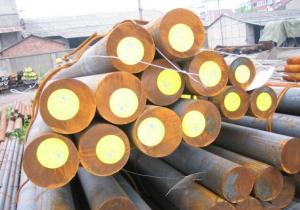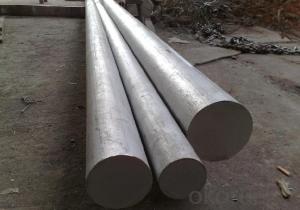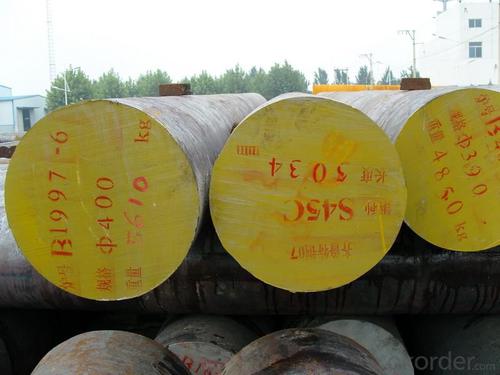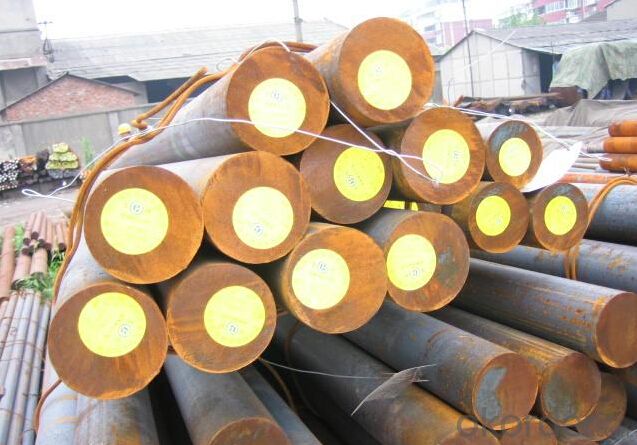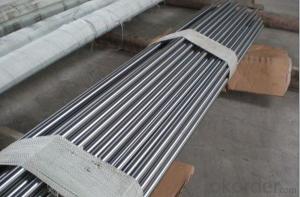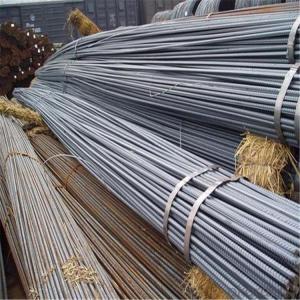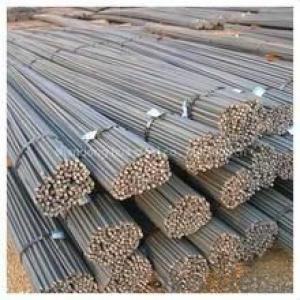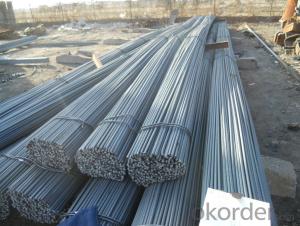HRB 400 Steel Rebar, Deformed Steel Bar
- Loading Port:
- China main port
- Payment Terms:
- TT OR LC
- Min Order Qty:
- 25 m.t.
- Supply Capability:
- 1000 m.t./month
OKorder Service Pledge
OKorder Financial Service
You Might Also Like
Specification
HRB 400 Steel Rebar, Deformed Steel Bar
Product information
1. Produce Standard: GB, AISI, ASTM, SAE, EN, BS, DIN, JIS
2. Produce processes: Smelt Iron -EAF smelt Billet - ESR smelt Billet -Hot rolled or forged get the steel round bar and plate
3. Heat treatment: Normalized / Annealed / Quenched+Tempered
4. Quality assurance: All order we can received third party inspection, You can let SGS, BV,.. and others test company test and inspect our products before Goods shipping.
Product detail
deformed steel bar steel rebar Chemical components (%)
| Grade | C | Si | Mn | P | S | Ceq |
| HRB335 | 0.25 | 0.8 | 1.6 | 0.45 | 0.45 | 0.52 |
| HRB400 | 0.25 | 0.8 | 1.6 | 0.45 | 0.45 | 0.55 |
Product show
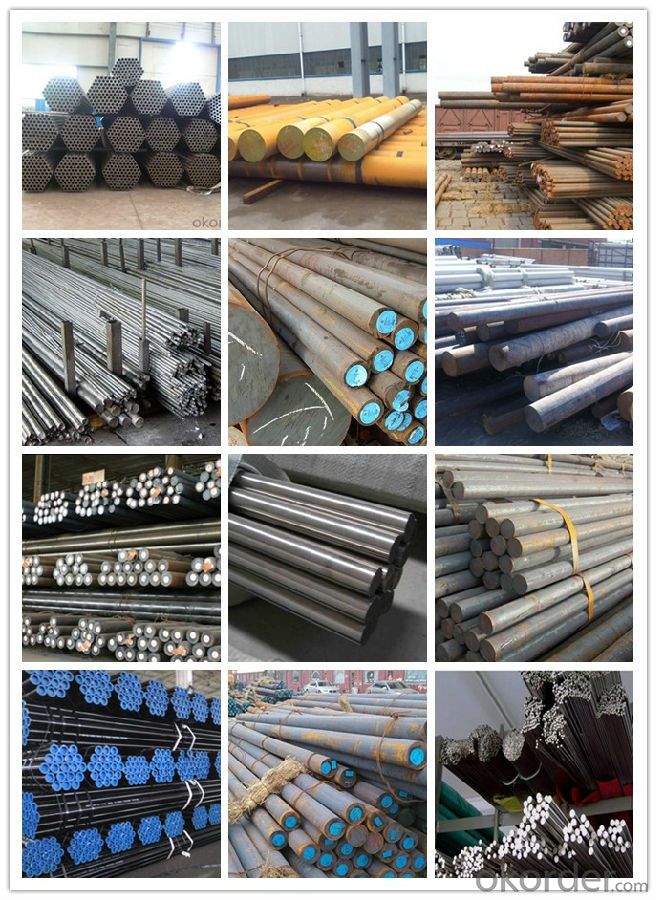
Work shop
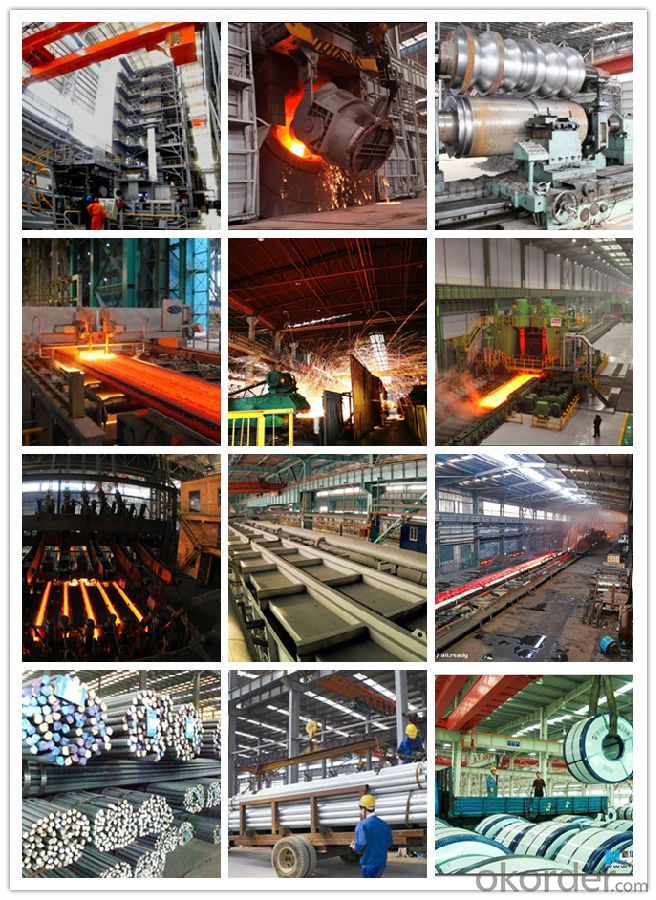
Our Services
* Welcome to contact us with your detailed inquiry, you will be replied within 24 hours.
* You are promised to obtain the best quality, price and service.
* We'd like to provide samples for your confirm.
- Q: How does special steel contribute to reducing material waste?
- Special steel contributes to reducing material waste through its unique properties and manufacturing processes. Firstly, special steel is known for its high strength and durability, which allows for the creation of products that have a longer lifespan and require less frequent replacement. This reduces the amount of material waste generated from constantly discarding and replacing worn-out products. Moreover, special steel is often designed to be easily recyclable. Its composition and manufacturing techniques allow for efficient recycling, enabling the reuse of steel scrap and minimizing the need for new raw materials. This significantly reduces material waste by preventing the accumulation of discarded steel products in landfills. Additionally, special steel's versatility and customization options play a vital role in reducing material waste. By tailoring the steel's composition and properties to specific applications, manufacturers can optimize the use of materials and avoid unnecessary waste. Special steel's ability to be formed into complex shapes and sizes further enhances its efficiency, as it reduces the amount of excess material that would typically be wasted during the manufacturing process. In summary, special steel contributes to reducing material waste through its strength and durability, recyclability, and customization options. By promoting longer product lifespans, efficient recycling processes, and optimized material usage, special steel plays a crucial role in minimizing waste and promoting sustainability.
- Q: What are the safety measures taken during the production of special steel?
- To ensure the safety and wellbeing of workers and reduce potential hazards, various safety measures are taken during the production of special steel. These measures encompass the following: 1. Personal Protective Equipment (PPE): All workers involved in special steel production must wear appropriate PPE, including safety helmets, goggles, gloves, and protective clothing. This safeguards them from injuries, burns, and exposure to hazardous substances. 2. Training and Education: Workers undergo comprehensive training and education on safe work practices and procedures. They gain knowledge about the potential hazards associated with special steel production and receive training on the proper handling of equipment and materials. 3. Risk Assessments: Regular risk assessments are conducted to identify potential hazards and evaluate the level of risk associated with each task. This facilitates the implementation of control measures to mitigate risks and prevent accidents. 4. Machinery and Equipment Safety: All machinery and equipment used in the production process are meticulously maintained and regularly inspected to ensure optimal working conditions. Safety features, such as emergency stop buttons and guards, are installed to prevent accidents and injuries. 5. Ventilation and Exhaust Systems: Given the high temperatures and use of chemicals in special steel production, ventilation and exhaust systems are installed to eliminate harmful fumes and gases from the work environment. This ensures a safe and healthy atmosphere for workers. 6. Fire Prevention: To minimize the risk of fire accidents, fire prevention measures are implemented, including the installation of fire alarms, extinguishers, and sprinkler systems. Workers are also trained on fire safety protocols and evacuation procedures. 7. Emergency Response Plans: Comprehensive emergency response plans are developed and communicated to all workers. These plans outline the steps to be taken in the event of accidents, fires, or other emergencies, ensuring a swift and organized response. 8. Regular Safety Inspections: Safety professionals conduct regular inspections to identify any potential safety hazards or non-compliance with safety protocols. Any issues or deficiencies are promptly addressed to maintain a safe working environment. By implementing these safety measures, special steel production can be carried out in a controlled and safe manner, safeguarding workers and minimizing the risk of accidents or injuries.
- Q: What are the thermal properties of special steel?
- Special steel, also known as tool steel or alloy steel, possesses excellent thermal properties. It has a high melting point, allowing it to withstand extreme temperatures without losing its structural integrity. Furthermore, special steel exhibits good heat resistance, ensuring it retains its strength and hardness even when exposed to high thermal loads. Additionally, its thermal conductivity is relatively low, making it suitable for applications where heat transfer needs to be controlled or minimized. Overall, the thermal properties of special steel make it a reliable material for various industrial and engineering applications that involve high temperatures and thermal stresses.
- Q: Is special steel suitable for electrical and electronic applications?
- Yes, electrical and electronic applications can benefit from the use of special steel. Special steel refers to steel alloys that are specifically designed to have certain properties or characteristics that make them suitable for specific applications. When it comes to electrical and electronic applications, special steel offers several advantages. One of the main requirements for electrical and electronic applications is high electrical conductivity. Although steel is not known for its electrical conductivity, certain special steel alloys can be engineered to have improved electrical conductivity. For example, by adding elements like nickel or copper to stainless steel, its electrical conductivity can be enhanced, making it suitable for applications where efficient flow of electrical current is needed. Magnetic properties are also important for electrical and electronic applications. Some special steel alloys exhibit exceptional magnetic properties, making them ideal for use in transformers, motors, and generators. These alloys possess qualities such as high magnetic permeability, low coercivity, and low hysteresis losses, which are crucial for efficient energy transfer and minimal power loss. Additionally, special steel provides excellent corrosion resistance, which is essential for electrical and electronic equipment that may come into contact with moisture or harsh environments. Stainless steel, for instance, is highly resistant to corrosion, ensuring the longevity and reliability of the equipment. In conclusion, special steel can be suitable for electrical and electronic applications when it possesses the necessary electrical conductivity, magnetic properties, and corrosion resistance. Manufacturers can ensure the performance, durability, and reliability of electrical and electronic equipment by selecting the appropriate special steel alloy.
- Q: Can special steel be used in the cement manufacturing industry?
- Yes, special steel can be used in the cement manufacturing industry. It is commonly used in the construction of cement plant equipment, such as kilns, crushers, and mills, due to its high strength, heat resistance, and durability. Special steel alloys are particularly suitable for applications that involve high temperatures and abrasive materials, making them an ideal choice for various components in the cement manufacturing process.
- Q: How does special steel contribute to the industrial equipment industry?
- Special steel plays a crucial role in the industrial equipment industry by providing superior strength, durability, and resistance to various harsh conditions. Special steel alloys are specifically engineered to possess exceptional properties that make them suitable for a wide range of applications in industrial equipment. One of the key contributions of special steel to the industry is its ability to withstand high temperatures and pressure. This makes it an ideal material for manufacturing components such as boilers, turbines, and heat exchangers. Special steel's high heat resistance ensures that these equipment can operate efficiently and reliably in demanding environments, thereby enhancing overall performance and safety. Furthermore, special steel is renowned for its excellent corrosion resistance, making it highly suitable for manufacturing equipment that comes into contact with corrosive substances. This includes chemical processing equipment, oil and gas pipelines, and marine structures. By using special steel in these applications, the industrial equipment industry can ensure longer operational lifetimes, reduce maintenance costs, and minimize the risk of catastrophic failures. Special steel also contributes to the industry by enabling the production of equipment with superior mechanical properties. Its unique composition and heat treatment processes allow for increased strength, toughness, and wear resistance. As a result, industrial equipment made from special steel can handle heavy loads, endure extreme conditions, and provide long-lasting performance. Additionally, special steel alloys can be tailored to meet specific requirements, allowing for the production of custom-made components. This flexibility enables the industrial equipment industry to design and manufacture equipment that meets the exact needs of various sectors, including aerospace, automotive, energy, and construction. Special steel's versatility and adaptability thus play a vital role in driving innovation and technological advancements within the industry. In conclusion, special steel significantly contributes to the industrial equipment industry by providing exceptional strength, durability, resistance to harsh conditions, and customized solutions. Its unique properties make it an essential material for manufacturing a wide range of equipment, ultimately enhancing performance, reliability, and safety across various sectors.
- Q: What are the different corrosion testing methods used for special steel?
- To assess and evaluate the resistance of special steel against corrosion, various testing methods are utilized. These include: 1. Salt Spray Testing: This method involves subjecting the special steel to a controlled mist of saltwater. The steel specimen is placed in a chamber where it is exposed to the mist for a specific duration. The resulting corrosion is visually evaluated and compared to established criteria. 2. Electrochemical Testing: To study the corrosion behavior of special steel, electrochemical techniques like potentiodynamic polarization and electrochemical impedance spectroscopy (EIS) are commonly employed. These methods measure the steel's current and potential responses in different corrosive solutions, providing information on corrosion rate and other electrochemical parameters. 3. Immersion Testing: In this method, the special steel is immersed in a specific corrosive solution for a predetermined period. The solution can be acidic, alkaline, or even simulated seawater, depending on the intended application. The corrosion-induced weight loss or surface damage is then measured and compared to assess the steel's corrosion resistance. 4. Crevice Corrosion Testing: This technique focuses on evaluating the susceptibility of special steel to crevice corrosion, which occurs in confined spaces or gaps. By creating a crevice between the steel specimen and another material and introducing a corrosive solution, the severity of crevice corrosion can be assessed. This can be done by measuring the depth of attack or using electrochemical methods. 5. Intergranular Corrosion Testing: Special steel is sometimes prone to intergranular corrosion, which occurs along the grain boundaries. Tests like the Strauss test or the Huey test are conducted to determine the steel's susceptibility to this form of corrosion. These tests involve immersing the steel in a corrosive solution at elevated temperatures and assessing the extent of intergranular attack. 6. Accelerated Testing: Accelerated corrosion testing methods aim to simulate the long-term effects of corrosion within a shorter time frame. Techniques like cyclic corrosion testing, which involve alternating exposure to different corrosive environments, can provide valuable insights into the steel's performance under realistic conditions in a shorter period. It should be noted that the selection of the corrosion testing method depends on the specific requirements, intended application, and environmental factors to which the special steel will be exposed.
- Q: What are the different surface cleaning methods used for special steel?
- There are several surface cleaning methods that can be used for special steel, depending on the specific requirements and the level of cleanliness desired. Some of the commonly used methods include: 1. Mechanical Cleaning: This method involves the use of abrasive materials or tools to physically remove dirt, rust, and other contaminants from the surface of the steel. It can be done through processes such as sanding, wire brushing, or abrasive blasting. 2. Chemical Cleaning: Chemical cleaning involves the use of chemical agents to dissolve or loosen dirt, grease, oil, or rust from the surface of the steel. Different types of chemicals can be used depending on the type and severity of the contaminants. Acid pickling is one such method that involves immersing the steel in an acid solution to remove scale and rust. 3. High-pressure Water Cleaning: This method utilizes the force of high-pressure water jets to remove dirt, grease, and other contaminants from the surface of the steel. It is effective in removing loose particles and can be used as a pre-cleaning step before other surface preparation methods. 4. Ultrasonic Cleaning: Ultrasonic cleaning is a non-abrasive method that uses high-frequency sound waves to create microscopic bubbles in a cleaning solution. These bubbles implode upon contact with the surface of the steel, effectively removing contaminants from hard-to-reach areas. 5. Electrochemical Cleaning: This method involves passing an electric current through a cleaning solution or electrolyte to facilitate the removal of contaminants from the steel surface. It is useful in removing rust and restoring the steel's appearance. 6. Thermal Cleaning: Thermal cleaning methods, such as flame cleaning or heat treatment, involve subjecting the steel to high temperatures to burn off organic contaminants or to induce controlled oxidation and subsequent removal of scale, rust, or other surface impurities. It is important to note that the choice of surface cleaning method depends on various factors, including the type of contaminants, the condition of the steel, the desired level of cleanliness, and the overall application requirements. A combination of different methods may be used to achieve the best results.
- Q: What are the challenges in working with special steel?
- Working with special steel can present various challenges due to its unique properties. One major challenge is its high hardness, which makes it more difficult to machine, shape, and weld compared to regular steel. Special steel also tends to have lower thermal conductivity, making it more susceptible to heat damage during cutting or grinding processes. Additionally, special steel alloys often have strict composition requirements, meaning precise control over the manufacturing process is necessary to achieve the desired material properties. Overall, the challenges in working with special steel primarily revolve around its hardness, thermal properties, and the need for precise manufacturing techniques.
- Q: Can special steel be used in the medical field?
- Yes, the medical field utilizes special steel. Special steel alloys, including but not limited to stainless steel, find extensive application in medical and surgical instruments, implants, and equipment. Stainless steel is selected for its remarkable resistance to corrosion, exceptional strength, and enduring durability. It is commonly employed in surgical instruments like scalpels, forceps, and needles, as well as in orthopedic implants like bone screws and plates. Moreover, special steel alloys are employed in the fabrication of medical equipment such as MRI machines and X-ray tables, where high strength and magnetic properties are imperative. In summary, special steel plays a pivotal role in the medical field owing to its distinctive characteristics and capacity to meet stringent criteria for hygiene, safety, and dependability.
Send your message to us
HRB 400 Steel Rebar, Deformed Steel Bar
- Loading Port:
- China main port
- Payment Terms:
- TT OR LC
- Min Order Qty:
- 25 m.t.
- Supply Capability:
- 1000 m.t./month
OKorder Service Pledge
OKorder Financial Service
Similar products
Hot products
Hot Searches
Related keywords

